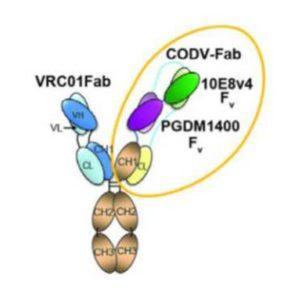One avenue that is being explored in a HIV vaccine is eliciting neutralising antibody responses. However, the diversity of the virus has made this challenging. Researchers from the National Institute of Allergy and Infectious Diseases have developed a trispecific antibody capable of binding to 3 distinct sites on the HIV Envelope (Env). This modified antibody was able to prevent infection in a non-human primate model and therefore may be a good candidate in the fight against HIV.
HIV is very diverse, resulting in challenges in developing an HIV vaccine capable of preventing infection across the different strains of the virus. Broadly neutralising antibodies (bnAbs) have been shown to prevent viral entry into cells. Although these antibodies are not subtype-specific, there are viruses which are resistant to neutralisation by some of these antibodies. Using different antibodies which target distinct epitopes on HIV Env have been shown to substantially increase coverage. In terms of using bnAbs in therapy, using a combination of antibodies has been shown to prevent viral escape towards all the sites targeted.
Researchers have now developed a trispecific antibody which contains binding sites that target three distinct epitopes of the HIV Env. They incorporated parts of monoclonal antibodies 10E8 (which targets the membrane proximal external region (MPER)), VRC01 (which targets the CD4-binding site) and PGDM1400 (which targets the V1/V2 apex). The researchers hypothesized that combining 3 antibodies into one would improve the efficacy of the antibody response and also simplify HIV treatment as only one protein would need to be administered
Out of 208 viruses tested against the trispecific antibody, only 4 viruses were resistant. The potency and breadth of this antibody was much higher than any single bnAb to date. The researchers also tested the half-life of the trispecific antibody of interest and found it to be 7.43 days which was longer than the other trispecific antibody combination they tested. The modified antibody was able to protect macaques from SHIV challenge, with none of the 8 animals tested becoming infected. The next steps of this study would be to validate the safety of this antibody in humans.
In summary, researchers have developed a modified antibody which has specificity to 3 distinct targets on HIV. This antibody may be beneficial in the treatment of individuals with HIV as the trispecificity may result in less chance of viral escape. Trispecific antibodies have the potential to be used in other diseases such as autoimmune conditions and cancers.
Journal article: Xu et al., 2017. Trispecific broadly neutralizing HIV antibodies mediate potent SHIV protection in macaques. Science
Article by Thandeka Moyo












